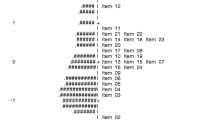Abstract
Basic scientific reasoning abilities in primary-school children have been documented in numerous studies. However, an empirically tested competence-structure model has not been developed, most likely due to the difficulty of capturing conceptual understanding in paper-and-pencil tasks. The Science-P project contributes to this research area by constructing and testing a theoretical model of the development of scientific reasoning in primary school. Based on our own competence-structure model, derived from developmental research, we constructed a comprehensive inventory of paper-and-pencil tasks that can be used in whole-class testing. This chapter provides an overview of the development of our inventory, and reports three central findings: (1) the convergent validity of our inventory, (2) the significant development of scientific reasoning in primary school from Grades 2 to 4, and (3) empirical proof of our competence-structure model.
Access this chapter
Tax calculation will be finalised at checkout
Purchases are for personal use only
Similar content being viewed by others
References
Bullock, M., Sodian, B., & Koerber, S. (2009). Doing experiments and understanding science: Development of scientific reasoning from childhood to adulthood. In W. Schneider & M. Bullock (Eds.), Human development from early childhood to early adulthood. Findings from the Munich Longitudinal Study (pp. 173–197). Mahwah: Erlbaum.
Carey, S., Evans, R., Honda, M., Jay, E., & Unger, C. (1989). An experiment is when you try it and see if it works. A study of junior high school students’ understanding of the construction of scientific knowledge. International Journal of Science Education, 11, 514–529.
Koerber, S., Sodian, B., Thoermer, C., & Nett, U. (2005). Scientific reasoning in young children: Preschoolers’ ability to evaluate covariation evidence. Swiss Journal of Psychology, 64, 141–152. doi:10.1024/1421-0185.64.3.141.
Koerber, S., Sodian, B., Kropf, N., Mayer, D., & Schwippert, K. (2011). Die Entwicklung des wissenschaftlichen Denkens im Grundschulalter: Theorieverständnis, Experimentierstrategien, Dateninterpretation [The development of scientific reasoning in elementary school: Understanding theories, experimentation strategies, and data interpretation]. Zeitschrift für Entwicklungspsychologie und Pädagogische Psychologie, 43, 16–21. doi:10.1026/0049-8637/a000027.
Koerber, S., Mayer, D., Osterhaus, C., Schwippert, K., & Sodian, B. (2015a). The development of scientific thinking in elementary school: A comprehensive inventory. Child Development, 86, 327–336. doi:10.1111/cdev.12298.
Koerber, S., Osterhaus, C., & Sodian, B. (2015b). Testing primary-school children’s understanding of the nature of science. British Journal of Developmental Psychology, 33, 57–72. doi:10.1111/bjdp.12067.
Kropf, N. (2010). Entwicklung und Analyse von Messinstrumenten zur Erfassung des wissenschaftlichen Denkens im Grundschulalter [Development and analysis of instruments for the measurement of scientific reasoning in elementary school] (Unpublished doctoral dissertation). LMU München, München.
Kuhn, D. (2010). What is scientific thinking and how does it develop? In U. Goswami (Ed.), Handbook of childhood cognitive development (2nd ed., pp. 472–523). Oxford: Blackwell.
Kuhn, D., Amsel, E., & O’Loughlin, M. (1988). The development of scientific thinking skills. San Diego: Academic Press.
Lederman, N. G. (2007). Nature of Science: Past, present, and future. In S. K. Abell & N. G. Lederman (Eds.), Handbook of research on science education (pp. 831–880). Mahwah: Erlbaum.
Lenhard, W., & Schneider, W. (2006). ELFE 1–6. Ein Leseverständnistest für Erst- bis Sechstklässler [ELFE 1–6. A reading proficiency test for children in Grades 1–6]. Göttingen: Hogrefe.
Mayer, D. (2012). Die Modellierung des wissenschaftlichen Denkens im Grundschulalter: Zusammenhänge zu kognitiven Fähigkeiten und motivationalen Orientierungen [Modeling scientific reasoning in elementary school: Relations with cognitive abilities and motivational orientations]. Doctoral dissertation. Retrieved from http://edoc.ub.uni-muenchen.de/14497/
Mayer, D., Sodian, B., Koerber, S., & Schwippert, K. (2014). Scientific reasoning in elementary school children: Assessment and relations with cognitive abilities. Learning and Instruction, 29, 43–55. doi:10.1016/j.learninstruc.2013.07.005.
Osterhaus, C., Koerber, S., Mayer, D., Schwippert, K., Sodian, B. (2013, August). Scientific reasoning: Modelling hierarchical levels of understanding. Poster presented at the 15th biennial EARLI conference, München.
Petermann, F., & Petermann, U. (Eds.). (2008). Hamburg-Wechsler-Intelligenztest für Kinder IV (HAWIK-IV) [Hamburg-Wechsler intelligence test for children IV (HAWIK IV)]. Bern: Huber.
Pollmeier, J., Möller, K., Hardy, I., & Koerber, S. (2011). Naturwissenschaftliche Lernstände im Grundschulalter mit schriftlichen Aufgaben valide erfassen [Do paper-and-pencil tasks validly assess elementary-school children’s knowledge of natural sciences]? Zeitschrift für Pädagogik, 6, 834–853. doi:10.3262/ZP1106834.
Pollmeier, J., Troebst, S., Hardy, I., Moeller, K., Kleickmann, T., Jurecka, A., & Schwippert, K. (2017). Science-P I: Modeling conceptual understanding in primary school. In D. Leutner, J. Fleischer, J. Grünkorn, & E. Klieme (Eds.), Competence assessment in education: Research, models and instruments (pp. 9–17). Berlin: Springer.
Sodian, B., Thoermer, C., Kircher, E., Grygier, P., Günther, J. (2002). Vermittlung von Wissenschaftsverständnis in der Grundschule [Teaching the nature of science in elementary school]. Zeitschrift für Pädagogik, Beiheft 45, 192–206.
Sodian, B., Thoermer, C., Grygier, P., Wang, W., Vogt, N., Kropf, N. (2006). Coding scheme to the nature of science interview (BIQUA NOS). Unpublished paper, LMU München, München.
Zimmerman, C. (2007). The development of scientific thinking skills in elementary and middle school. Developmental Review, 27, 172–223. doi:10.1016/j.dr.2006.12.001.
Acknowledgments
The preparation of this paper was supported by grants to Susanne Koerber (KO 2276/4-3), Beate Sodian (SO 213/29-1/2); and Knut Schwippert (SCHW890/3-1/3) from the German Research Foundation (DFG) in the Priority Program “Competence Models for Assessing Individual Learning Outcomes and Evaluating Educational Processes” (SPP 1293).
Author information
Authors and Affiliations
Corresponding author
Editor information
Editors and Affiliations
Rights and permissions
Copyright information
© 2017 Springer International Publishing AG
About this chapter
Cite this chapter
Koerber, S., Sodian, B., Osterhaus, C., Mayer, D., Kropf, N., Schwippert, K. (2017). Science-P II: Modeling Scientific Reasoning in Primary School. In: Leutner, D., Fleischer, J., Grünkorn, J., Klieme, E. (eds) Competence Assessment in Education. Methodology of Educational Measurement and Assessment. Springer, Cham. https://doi.org/10.1007/978-3-319-50030-0_3
Download citation
DOI: https://doi.org/10.1007/978-3-319-50030-0_3
Published:
Publisher Name: Springer, Cham
Print ISBN: 978-3-319-50028-7
Online ISBN: 978-3-319-50030-0
eBook Packages: EducationEducation (R0)




